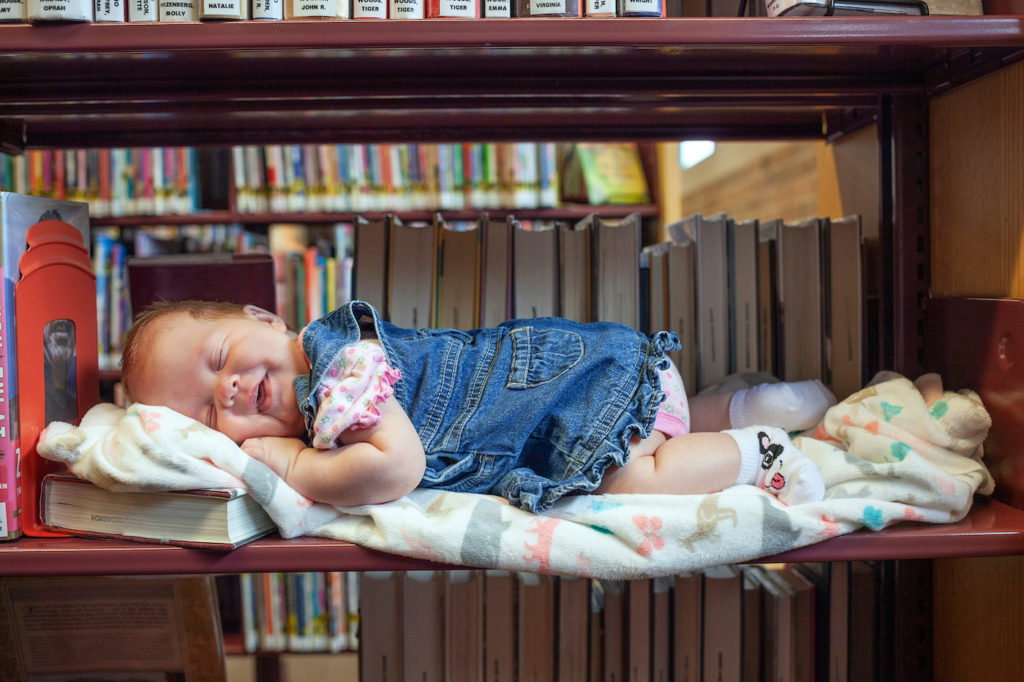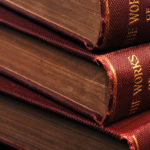In last month’s Bookshelf column, Matthew Franck addressed a number of questions from a Twitter acquaintance, including the problem of how to find time to incorporate personal reading into our busy lives. Though Matt saw this as relatively straightforward (his advice: “one just has to make time, and make a habit of reading for pleasure”), I believe the problem merits further reflection, perhaps because I’ve recently been encountering it in one of its most extreme forms: how to find time to read as a new parent.
Last year, I became a father for the first and second time, with the arrival of our twin daughters. This has been a joy and a blessing, but there is no doubt that it also represents a daunting challenge in terms of reading. Cosmologists may yet discover why time breaks down at the event horizon of a black hole, but they may never be able to explain how it seems to evaporate upon contact with two small beings who cannot support their own heads. Though one of my favorite books is, tellingly, Cardinal Robert Sarah’s The Power of Silence, I don’t quite share the bleak assessment of Evelyn Waugh’s friend Cyril Connolly that “there is no more somber enemy of good art than the pram in the hall.” Yet it is difficult to deny that babies, particularly twins, can make the prospect of reading (or indeed any creative activity) seem remote. (And, to update Connolly in American terms, I’ve found that a double stroller in the hall is, if nothing else, the enemy of space.)
I appreciate that trying to read—or write or work or worship—in difficult circumstances is hardly a new dilemma. Wittgenstein wrote his Tractatus in the unpromising context of the trenches of World War I, with shells regularly whistling by his head, which might go some way to explaining the book’s famous conclusion on the value of silence. Just a few years later, Virginia Woolf hoped to “escape a little from the common sitting-room,” though I can attest that fleeing from the cramped housing of Cambridge to the expansive suburbs of America is no panacea for overcoming the more unruly aspects of traditional domesticity.
Yet the demand for time management strategies for reading suggests that the dilemma is real, persistent, and possibly intensifying as home life and work life become ever more entangled. In fact, Matt’s advice—make time and read for pleasure—might be restated in the form of two alternative principles to help incorporate reading into our busy lives, as parents or otherwise: ritualistic reading and whimsical reading.
Start your day with Public Discourse
Sign up and get our daily essays sent straight to your inbox.Ritualistic Reading
For the purposes of reading, it’s a mistake to think about time purely in instrumental terms. Contrary to the familiar time management injunctions to “be more efficient” or “set clear objectives,” reading time isn’t (or shouldn’t just be) about achieving a measurable goal—pages read, lessons learned, knowledge assimilated. And reading cannot be reduced to one item on a to-do list, not only because parents will always have something more urgent to do, but also because it ensures that reading will be reduced to the status of yet another unfulfilling task.
Instead, it’s worth considering Plato’s insight that time is “the moving image of eternity.” Yes, I know: early parenthood is more about milk than metaphysics. But what Plato meant is that time, and indeed every type of earthly motion or activity, is modeled on a perfect, eternal archetype. (This idea might resonate with parents who, while sharing a joyful moment with their baby, feel like they have somehow stepped outside of time’s regular flow.) As finite beings, ritual is one way in which we perform actions that we believe might express a deeper or eternal truth. With this in mind, approaching reading ritualistically turns out to be a surprisingly effective way to incorporate it into the rhythm of the day.
Ritualistic reading—incorporating reading as a ritual, as part of the pattern of the day—allows us, paradoxically, to remove ourselves from that pattern.
For parents, ritualistic behavior will be familiar, since caring for children entails innumerable little customs and traditions that give structure, meaning, and coherence to life. Similarly, ritualistic reading—incorporating reading as a ritual, as part of the pattern of the day—allows us, paradoxically, to remove ourselves from that pattern.
Ritualistic reading concerns not just time, but also space. As Plato knew, our physical world is infused with divinity. This recognition can help guide the practice of reading, as space can be used ritualistically too—perhaps in terms of a chair or a room or a special location that is intentionally set aside for the ritual of reading. Making use of physical books could be part of this, as it not only limits distractions from electronic devices, but quite literally gives extra weight to the physicality of reading as ritual.
Since becoming a parent, I have sought—haltingly, imperfectly—to practice ritualistic reading in my own daily routine. After we put the twins down to sleep (and on the heroic assumption that they stay down), I step outside to read on the bench on our front porch before the light fades. Though regularly scheduled, this practice still enables me to feel like I’m stepping outside of time—or at least outside of the anxieties of the day—and engaging in the kind of immersive, deep reading that just wouldn’t ordinarily or accidentally happen. On particularly good days, it can even feel like I’m not just fitting in reading around everything else, but reading as a fundamental part of a day that just happens to involve other things.
Whimsical Reading
In last month’s column, Matt observed that “reading should often be a lark, an indulgence—not a chore or even a hunt for ‘useful’ knowledge.” This is a valuable insight for readers in general and for new parents in particular. It is regularly claimed that parenting requires extreme focus, discipline, and productivity. With so little time, the logic goes, parents should only do what matters. This might lend itself to the notion that any available reading time must be devoted to “serious” or “important” books, of the kind that might be required by a college syllabus. Shakespeare or Dante after a long day of parenting, anyone?
I should note that I love reading, teaching, and advocating the great books, and Public Discourse regularly publishes some of the most compelling essays on this front. By all means turn to these texts if they provide comfort or wisdom in stressful times. But whimsical reading—reading for fun, for play, for no discernible purpose—should always be encouraged, especially in the case of parents who struggle to find ways to approach reading joyfully—or at all. Indeed, the kind of ritualistic, deep, immersive reading I described above requires an openness to a certain inefficiency and aimlessness. And there are two other reasons that whimsical, playful reading might resonate with, and prove useful for, parents.
First, caring for babies teaches important lessons about the meaning and significance of “play.” Babies play not to achieve goals, or advance agendas, or get something out of the world. Rather, they play in the spirit of “an experience of enjoyment that has no ulterior purpose, no further result aimed at, and begins and ends in itself.” That was the philosopher Michael Oakeshott’s definition of play, which he saw as distinct from work or rest, but it could just as easily serve as a definition of reading in its proper whimsical character.
We would benefit from reading playfully, freely, unconventionally, and without regard for acknowledgment or attention.
Second, just like whimsical reading, parenthood involves doing small and often silly things, not for any kind of public recognition, but because they are worth doing for their own sake. Reading, like parenting, need not be a public performance. Although we now have the capacity to track our reading like dieters track calories—and no doubt there are many people who do both at the same time, sharing the results for all to see—we would benefit from reading playfully, freely, unconventionally, and without regard for acknowledgment or attention.
The Art of Not Reading
If all else fails, and it becomes too problematic to fit reading into the rigors of parenthood, we might find consolation in what Arthur Schopenhauer called “the art of not reading.” This seems counterintuitive for a philosopher, but Schopenhauer was both a contrarian and a curmudgeon—so much so, in fact, that he once remarked that he didn’t mind the idea of worms gnawing his body after death, but he did reflect with horror on how future philosophers might misrepresent his work. (A non-parent, this is how he thought about his legacy.)
But Schopenhauer’s point on cultivating the art of not reading is a serious one, and it bears directly upon the dilemma of deciding how or what to read amid the upheavals of parenting. He believed that whatever book might be engaging the attention of the general public at any particular time is likely to be just a reflection of that culture’s ephemeral trivia—political, cultural, or literary fads. Thus, knowing how not to read is as necessary as being able to navigate a library. This is actually consistent with ritualistic reading, since it promotes a more intentional and less scattershot approach, and of course it saves time and thereby benefits overburdened parents.
If we don’t cultivate the art of not reading—if we read too excessively or indiscriminately—we won’t just find ourselves immersed permanently in trivia. We’ll also risk undermining our independence and originality of thought. After all, reading too much can often be synonymous with thinking too little, as we substitute the author’s ideas for our own. This matters from a parenting perspective, because having children is an extraordinary and probably unique opportunity to learn about human nature. To fully embrace this opportunity, we need intellectual capacity, not cluttered minds.
I hesitate to extol the virtues of not reading in a column entitled “The Bookshelf.” (Ferdinand in Love’s Labour’s Lost: “How well he’s read, to reason against reading!”) But if parenting—or life in general—proves to be too inhospitable to reading consistently, then perhaps it can be seen as a happy diversion from the fashions and trends that dictate so much of what we read, and discuss, and therefore think.
Finding time to read is always challenging, particularly in the context of being a new parent. Instead of conventional, and often ineffectual, time management strategies, I recommend the alternative principles of ritualistic reading and whimsical reading, while acknowledging that I don’t always live up to them myself. And on cultivating the art of not reading, please don’t apply this principle to “The Bookshelf,” whose regular incumbent returns next month.














